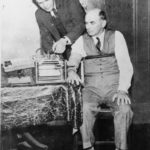 Polygraphs, popularly known as lie detectors, measures a person’s physiological status when asked a pre-determined set of questions designed to evaluate truthfulness. Polygraphs measure heart rate, respiration, blood pressure, and skin conductivity. They remain controversial and have been so since their invention in 1921 by a University of California Berkley medical student and a police officer. In fact, the US Supreme Court (cf. U.S. v. Scheffer, 1998), have repeatedly rejected the use of polygraph evidence because of its inherent unreliability. Polygraphs are inadmissible in state court and can’t be introduced into evidence in federal court unless both parties agree to their inclusion.
Polygraphs, popularly known as lie detectors, measures a person’s physiological status when asked a pre-determined set of questions designed to evaluate truthfulness. Polygraphs measure heart rate, respiration, blood pressure, and skin conductivity. They remain controversial and have been so since their invention in 1921 by a University of California Berkley medical student and a police officer. In fact, the US Supreme Court (cf. U.S. v. Scheffer, 1998), have repeatedly rejected the use of polygraph evidence because of its inherent unreliability. Polygraphs are inadmissible in state court and can’t be introduced into evidence in federal court unless both parties agree to their inclusion.
So, why did Florida State Senator have his own law firm administer a polygraph test in order for him to clear his name concerning serious sex abuse allegations?
“Latvala is being truthful,” states the polygraph report, which was administered by his legal team. “He passed his examination and would be classified as non-deceptive.”
Fighting accusations that could ruin his career and have nearly doomed his candidacy for governor, Latvala said his attorney, Steve Andrews, hired Timothy Robinson, a Tallahassee polygraph expert and retired chief polygraph examiner for the Florida Department of Law Enforcement.
In Latvala’s eyes, the successful polygraph proves his innocence. Of course, he’d say that, he wants to clear his name and get back on the gubernatorial campaign trail.
Just how accurate are polygraph tests? Can they be used to clear someone accused of a crime or scandalous behavior?
As psychologist Leonard Saxe, PhD, (1991) has argued, the idea that we can detect a person’s veracity by monitoring psychophysiological changes is more myth than reality. Even the term “lie detector,” used to refer to polygraph testing, is a misnomer. So-called “lie detection” involves inferring deception through analysis of physiological responses to a structured, but unstandardized, series of questions.
The accuracy (i.e., validity) of polygraph testing has long been controversial. An underlying problem is theoretical: There is no evidence that any pattern of physiological reactions is unique to deception. An honest person may be nervous when answering truthfully and a dishonest person may be non-anxious. Also, there are few good studies that validate the ability of polygraph procedures to detect deception. As Dr. Saxe and Israeli psychologist Gershon Ben-Shahar (1999) note, “it may, in fact, be impossible to conduct a proper validity study.” In real-world situations, it’s very difficult to know what the truth is.
A particular problem is that polygraph research has not separated placebo-like effects (the subject’s belief in the efficacy of the procedure) from the actual relationship between deception and their physiological responses. One reason that polygraph tests may appear to be accurate is that subjects who believe that the test works and that they can be detected may confess or will be very anxious when questioned. If this view is correct, the lie detector might be better called a fear detector.
Some confusion about polygraph test accuracy arises because they are used for different purposes, and for each context somewhat different theory and research is applicable. Thus, for example, virtually no research assesses the type of test and procedure used to screen individuals for jobs and security clearances. Most research has focused on specific incident testing. The cumulative research evidence suggests that CQTs detect deception better than chance, but with significant error rates, both of misclassifying innocent subjects (false positives) and failing to detect guilty individuals (false negatives).
“The public needs to know that polygraph testing has no scientific basis and is inherently biased against truthful people, yet liars can train themselves to pass,” said George Maschke, the co-creator of Antipolygraph.org.
Maschke, whose website aims to expose the test’s shortcomings, told Business Insider that just one insight could have a huge impact on a person’s results: Examiners expect takers to lie on certain questions, known as control or comparison questions.
These “control questions” include harmless accusations that most people wouldn’t admit to, such as “Have you ever lied to get out of trouble?” or “Have you ever taken supplies from work?”
In 2002, the National Academy of Sciences published one of the most comprehensive studies of polygraph accuracy, concluding that while the tests could “differentiate lying from telling the truth at rates well above chance,” they weren’t accurate enough for security purposes.
So, the unanswered question-why did Jack Latvala take a polygraph and claim the results prove his innocence? Perhaps, he’s desperate and needed some good news to break the bad news cycle.
Whatever the reason in the Latvala saga, polygraphs are not a completely reliable measure of truth telling or deception.
